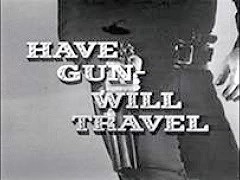
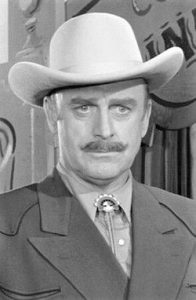 Have Gun–Will Travel (1958-60) aired “Oil” on October 30, 1960 as the show’s 102nd episode out of what would be a total of 106 over its two year run. This is only the sixth episode we have shared of this much loved western, the first being in September of 2019, the second and third coming in March and October of 2020, and the fourth and fifth in April and December of 2021, respectively. A recap of the backstory of the program is in order for newcomers.
Have Gun–Will Travel (1958-60) aired “Oil” on October 30, 1960 as the show’s 102nd episode out of what would be a total of 106 over its two year run. This is only the sixth episode we have shared of this much loved western, the first being in September of 2019, the second and third coming in March and October of 2020, and the fourth and fifth in April and December of 2021, respectively. A recap of the backstory of the program is in order for newcomers.
The very existence of the radio show is an odd duck, in that while not unique it was one of the very rare radio shows to be a spinoff of a successful tv show, which is backwards from the usual sequence of events, with the radio show coming first, then the tv show (for examples of the usual order, see Gunsmoke, Dragnet, and The Lone Ranger). In this case, Have Gun–Will Travel on television first aired in 1957 and its radio counterpart aired its first episode just over a year later in 1958. The original CBS tv series would run from September 1957 through April of 1963 and proved quite popular. Richard Boone (1917-1981) starred as Paladin, a cultured, educated, gun-for-hire living in San Francisco’s swanky Carlton Hotel during the period following the Civil War to approximately 1875 as a well-appointed man of wealth and sophistication, who earned his living by putting ads in local newspapers as a high-priced gunslinger with the simple calling card of “Have Gun–Will Travel.” While expensive to hire ($1,000 per day plus expenses) and ready, willing, and able to use his trademark gun when necessary, he often was a master at settling disputes or resolving issues in a diplomatic and bloodless manner.
 The term “paladin” itself has several meanings, among them “champion of the realm” or “trusted military leader” or even “a knight without armor in a savage land.” You get the idea. Paladin’s trademark is the iconic chess character of the knight, which he showcases on his signature black holster and on his business card. As backup to his handgun, Paladin also carried a double-barreled derringer behind his belt.
The term “paladin” itself has several meanings, among them “champion of the realm” or “trusted military leader” or even “a knight without armor in a savage land.” You get the idea. Paladin’s trademark is the iconic chess character of the knight, which he showcases on his signature black holster and on his business card. As backup to his handgun, Paladin also carried a double-barreled derringer behind his belt.
Famed radio director of such shows as Suspense, Escape, and later the popular tv westerns such as The Virginian and Gunsmoke, Norman Macdonnell championed the idea of spinning off a successful tv show to radio, and Have Gun–Will Travel on radio was born. One of my favorite radio and tv actors, John Dehner (1915-1992), was cast as radio’s Paladin, his resonating baritone perfect for the role. Dehner himself was in many ways like the character he played, for his father traveled a lot and Dehner went to school and was educated mostly in Europe (though he was born in New York). Along the way, he learned to speak four languages fluently and others to a lesser degree (including Norwegian, French, Spanish, Italian, Swedish, and even some Hopi Indian). In the early 1940s Dehner worked for Walt Disney Studios as an animator and did work for such iconic animated features as Fantasia (1940), Bambi (1942) and some Pluto, Donald Duck, and Mickey Mouse cartoons. After a stint in the Army during World War II he held jobs as a radio news editor and disc jockey, then graduated to numerous acting roles of various sizes, including, but not limited to shows such as The Hermit’s Cave (as host), and supporting roles in The Whistler, Gunsmoke, Suspense, Escape, Philip Marlowe, Frontier Gentleman (star), and the week following the demise of Frontier Gentleman, the star of Have Gun–Will Travel.
John Dehner’s television and film roles are far too many to list here, but he appeared in 125 feature films and shorts, and in well over another 100 tv roles from mystery to western to science fiction and is easily recognizable for his blue eyes, moustache, and again his iconc baritone that Radio Life Magazine said was the industry’s “best radio voice.” Of interest to SF fans, Dehner appeared three times on the original The Twilight Zone: in the first season as Captain Allenby in “The Lonely,” as engineer Alan Richards in “The Jungle” in its third season, and in its fifth and final season as Jared Garrity in “Mr. Garrity and the Graves.”
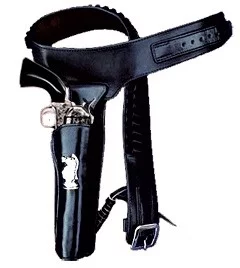 Of interest is that Norm Macdonnell was not only the champion of spinning off a radio program from its parent television show, but his idea to rewrite as closely as possible for radio the original tv scripts, thus, the initial 30 episodes of Have Gun were lifted from the already aired tv shows. [After that, Macdonnell would leave the show and go on to direct and write for television’s Gunsmoke, tv’s longest running (to that time, 1955-75) continuous prime time show in history.]
Of interest is that Norm Macdonnell was not only the champion of spinning off a radio program from its parent television show, but his idea to rewrite as closely as possible for radio the original tv scripts, thus, the initial 30 episodes of Have Gun were lifted from the already aired tv shows. [After that, Macdonnell would leave the show and go on to direct and write for television’s Gunsmoke, tv’s longest running (to that time, 1955-75) continuous prime time show in history.]
Last but not least, from an article in AVClub from 2014 by Brandon Nowalk titled “The Adult Western Peaked with Have Gun–Will Travel”: “…the adult Western, nominal or otherwise, is what TV audiences were looking for in the late ’50s. Have Gun – Will Travel wasn’t the first, it wasn’t the most popular, and it didn’t last the longest. But it was the best. Have Gun picked up the pieces of the adult Western and assembled them into something greater. There was Gunsmoke’s dramatic power, Earp’s pretension, and Cheyenne’s rootless energy. And where those others lost cast members, dipped in quality, or completely transformed, Have Gun stayed steady, a strong half-hour black-and-white adventure leading into Gunsmoke every Saturday night for six years.” Though it is true that Have Gun wasn’t the most popular show of its time, Nielsen ratings confirm that it ranked near the very top of the heap with a #3 or #4 rating for its first four years. (Gunsmoke would take top honors as the #1 show for four years, from 1958-61.)
This Episode, “Oil,” begins when a young man arrives in San Francisco seeking Paladin’s help. He is the son of a recently deceased friend of Paladin’s who hires him to make sure he is not swindled in an oil deal he is interested in purchasing with some of the money his father has left him. It turns out to be a slick con, but most certainly not of the sort you are ever likely to run across in the Beginners Handbook of Cons™, and with an ending I daresay you’ll be hard-pressed to guess. On a contemporary note, since most Americans are being severely affected by the current Administration’s fossil fuel policies–with a key emphasis on oil production (the end result being the highest gasoline prices in the country’s history)–we thought an episode with oil as its focus to be rather timely.
Play Time: 23:56
[Below: Paladin on radio, John Dehner, left — Paladin on tv, Richard Boone, right]
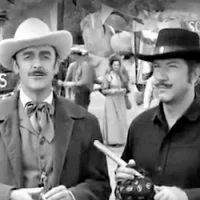
[Below: Paladin’s iconic business card]
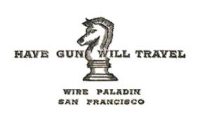
{Since this episode aired on a Sunday evening, the day before Halloween, the next day, a Monday, promised to be a big one for the neighborhood gang. After school they would have enough time to make it to the corner newsstand and be home in plenty of time to don costumes and hit the neighborhood in the hope of scoring at least one big bag of candy they could devour while reading their recent pulp purchases. A two-for and a kid’s dream to be sure. Analog (1930-present) for October 1960 was a landmark issue of sorts. Since 1930 and with minor variation this magazine’s title had been Astounding SF. With the February 1960 issue it began slowly transitioning to Analog, with both titles at the top of the cover. With this very issue—October 1960—the transition was complete. No more Astounding, and only Analog, a title (again with minor variation) it has now retained for the past 62 years. It was a monthly in 1960. The Magazine of Fantasy & Science Fiction (1949-present) celebrated its 11th Anniversary with the issue below. And what a celebration! Reading the names on the cover almost makes one weep for the classic and beloved names gathered inside. Truly a landmark issue. F&SF was a monthly in 1960. IF (1952-74) was a companion/sister magazine to Galaxy. After a few editorial changes along the way it found its voice and became one of the leading SF magazines of the day, its popularity peaking in the 1960s after Frederik Pohl took the editor’s chair. Under Pohl’s guidance IF would be honored with three successive Hugo Awards for Best Professional Magazine for the years 1966-68. It was a bi-monthly in 1960.}
[Left: Analog, Oct. 1960 – Center: F&SF, Oct. 1960 – Right: IF, Sept. 1960]
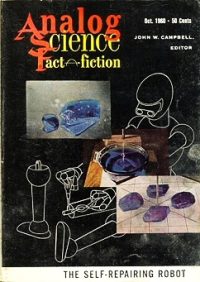
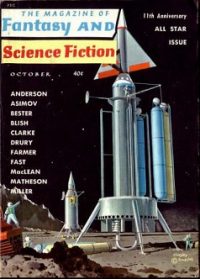
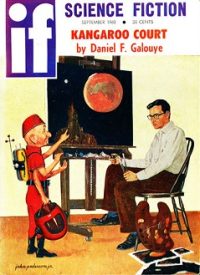
To view the entire list of weekly Old Time Radio episodes at Tangent Online, click here.